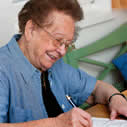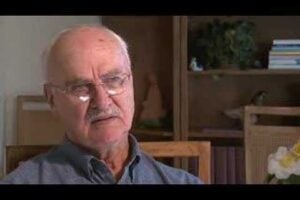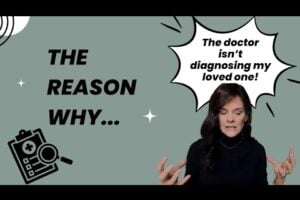
Memory concerns? Interested in learning about brain health?
Take part in this week’s 10th annual National Memory Screening Day.
NEW YORK, Nov. 1, 2012
/PRNewswire-USNewswire/ — Misperceptions about Alzheimer’s disease and other
memory problems continue to lead many Americans to believe that memory loss,
personality changes and other symptoms are a “normal part of aging.”
That’s why the Alzheimer’s Foundation of America (AFA) is encouraging anyone
with memory concerns and those interested in learning about brain health to
take part in its 10th annual National Memory Screening Day (NMSD) on
November 13.
About 2,500 community sites nationwide will be offering free, confidential
memory screenings and educational materials about memory problems and
successful aging on NMSD itself or another day in November. The event takes
place during National Alzheimer’s Disease Awareness Month.
An initiative that began in 2003 and has grown exponentially since, NMSD
marks its 10th anniversary as the nation is focusing increasing
attention on the escalating incidence of Alzheimer’s disease.
The first National Plan to Address Alzheimer’s Disease, released in May by
the U.S. Department of Health and Human Services, includes a call for a greater
emphasis on early diagnosis, as well as educating the public and healthcare
professionals about Alzheimer’s disease and related dementias. In addition, a
new Medicare annual wellness exam includes detection of cognitive impairment as
one of the free preventive services for beneficiaries.
“It’s time to bring memory concerns more into the mainstream,”
said Eric J. Hall, AFA’s president and CEO.
“While it may seem unconventional for a healthcare professional to provide
a memory screening at a community venue like a library, a house of worship or
even a shopping mall, a decade of hands-on experience in testing hundreds of
thousands of people through AFA’s memory screening initiative has made clear
that these tools are an effective intervention—a first and convenient step to
finding out what’s really going on. And in reality, it can end up making a real
change in people’s lives.”
During NMSD, qualified healthcare professionals across the country will
administer face-to-face screenings. A screening consists of a series of
questions and tasks, and takes about five to 10 minutes. Screeners emphasize
that the test results do not represent a diagnosis, and encourage people with
below-normal scores as well as those who still have concerns to pursue a full
medical exam.
Participating sites include Alzheimer’s agencies, senior centers, assisted
living facilities, libraries, Ys, doctor’s offices, and pharmacies. Among them,
Kmart’s 922 pharmacies will offer the memory screenings, as well as blood
pressure and body mass index screenings, on November 14.
To locate a screening site, visit www.nationalmemoryscreening.org
or call (toll-free) 866-232-8484.
Evidence that memory problems are not being addressed, an AFA survey of NMSD
participants in 2010 found that 92 percent of those polled had never been given
a screening by their primary healthcare provider; what’s more, 83 percent who
were worried about their memory had not discussed their concerns with a
healthcare provider. Nearly 12 percent of participants surveyed failed the
administered screening test.
According to the findings of a recent survey conducted by Harris Interactive
for AFA, two-thirds of caregivers said they initially mistook behavioral
symptoms of Alzheimer’s disease, such as irritability and aggression, as
“normal aging.” As a result, those false impressions delayed their
loved one’s diagnosis of the incurable brain disorder.
“The results of past National Memory Screening Days highlight the value
of early detection of memory problems and point the way to proper clinical
diagnosis,” emphasized J. Wesson Ashford,
M.D., Ph.D., chair of AFA’s Memory Screening Advisory Board and senior research
scientist at Stanford/VA Medical Center, Palo Alto, CA.
According to research reports, general practitioners miss about half of all
dementia cases. Some memory problems can be readily treated, such as those
caused by vitamin deficiencies or thyroid problems. Other memory problems might
result from causes that are not currently reversible, such as Alzheimer’s
disease.
Ashford noted that “early recognition of Alzheimer’s disease can help
diagnosed individuals and their families in many ways.” For instance, they
can benefit from available treatments that can help slow progression of
symptoms, as well as plan for the future and access social services support.
A recent survey by Working Mother magazine found that 84 percent of
caregivers of family members with Alzheimer’s disease said they would want to
be diagnosed early and 51 percent wish their loved ones had been diagnosed
sooner.
As many as 5.1 million Americans have Alzheimer’s disease, which causes loss
of memory and other intellectual functions, and is the sixth leading cause of
death in the United States. Warning signs include forgetting people’s names and
events, asking repetitive questions, loss of verbal or written skills,
confusion and personality changes.
This year, more than 30 leading professional organizations, including the
American Academy of Neurology, are supporting NMSD. Silver sponsors are Accera,
Inc., Forest Laboratories, Novartis Pharmaceuticals and Senior Helpers.
The Alzheimer’s Foundation of America, based in New
York, is a national nonprofit organization that unites more than 1,600
member organizations nationwide with the goal of providing optimal care and
services to individuals confronting dementia, and to their caregivers and
families. Its services include counseling and referrals by licensed social
workers via a toll-free hot line, e-mail, Skype, and live chat; educational
materials; a free quarterly magazine for caregivers; and professional training.
For more information about AFA, call toll-free 866-232-8484 or visit www.alzfdn.org.










